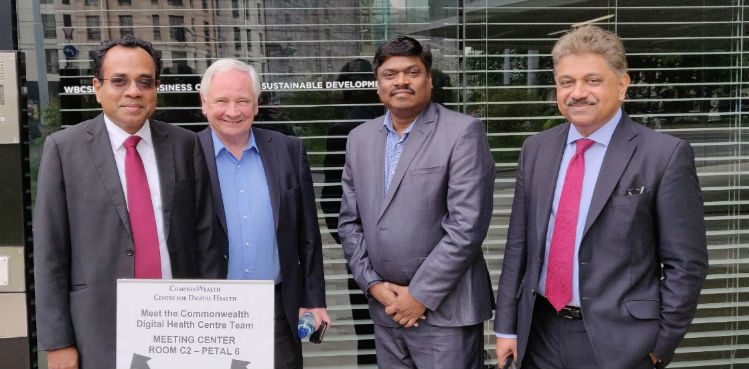
Strengthening Health Systems through leveraging Digital Health Interventions
Reflections from 'Building Collaborative Partnerships for Digital Health Initiatives across the Commonwealth and Beyond' - a Ministerial Side Meeting held during the 72nd Session of the World Health Assembly at Graduate Institute Geneva on 20 May 2019, Geneva, Switzerland.
To achieve universal health coverage there is an urgent need to leverage digital technologies and tools that are accessible, affordable and acceptable to the end users. Recognizing the potential of digital health as an enabler for health systems strengthening resulted in the adoption of the World Health Assembly Resolution on Digital Health at its 71st session in Geneva in May 2018.
This resolution brought global attention to the potential, opportunities and challenges of Digital Health interventions. As member countries are embarking on implementing these digital health interventions, an opportunity to share experiences and best practices was an expressed need articulated by several ministers during the Inaugural Commonwealth Health Ministers side meeting during the World Health Assembly 2018. The side meeting during the #WHA72 was held as a response to this.
Dr. Soumya Swaminathan, Chief Scientist at the World Health Organization outlined in brief the WHO Digital Health Strategy;
“A major step in the transformational journey that WHO is undertaking is a new, systematic way of harnessing the power of science and innovation, including digital innovation. A top priority of the new Department of Digital Health is to explore how digital and mobile technologies can accelerate countries progress towards UHC,” she said.
As a member state organization, WHO has a unique role to play in advising countries about how to maximize the opportunities presented by digital technologies, including bringing appropriate regulation and legislation. Countries must make their own decisions about how to integrate digital technologies into their policies and programs in ways that support their national priorities and particular contexts.
Digital technologies can be used for health in many ways. They provide concerted opportunities to tackle health systems challenges. They can be used to facilitate targeted communications to people to generate demand and increase coverage. They may also be targeted to health workers to give them more importantly access to clinical protocols through decision-support mechanisms or telemedicine consultations with specialists and other experts.
Honourable Dr. Duann Sands, Minister of Health, Bahamas shared that as a country they started on an aspirational journey of implementing digital health records several years back and after investing several millions, they have not been able to see any success on this front. Protecting Member countries from such digital catastrophes is an urgent priority and member countries would immensely benefit from technical guidance on digital health implementation frameworks, including solution and vendor selections, he said and urged the CWCDH and WHO to work jointly towards achieving this.
Honourable Dr. Christopher Tufton, Minister of Health, Jamaica who is a passionate crusader against the non- communicable disease epidemic shared that we need to leverage the power of digital health technologies for behavior change and appropriate guidance on the most effective solutions that has potential to scale for impact is the need of the hour. He congratulated the organizers for providing such a forum to discuss and develop such implementation plans.
Prof Vajira Dissanayake, Chair of Commonwealth Centre for Digital Health said:
“Our objective since creating this initiative is to accelerate the deployment and scale-up of Digital Health and Care Solutions, and encourage collaboration across 78 Countries with a combined population of 4.6 billion citizens; he also thanked the George Institute for the stellar technical support provided during the course of the establishment of the Commonwealth Centre for Digital Health and the high level ministerial panel discussions and said that he looked forward to ongoing partnership with the George Institute."
Dr. Oommen John who represented George Institute and facilitated the ministerial discussions summarizes the key discussion points from the ministerial perspectives.
Today the healthcare systems across the world are faced with a number of challenges, while the health care delivery capacity continues to be suboptimal, the citizens have access to a large number of “off the shelf solutions” for personal health management in the form of digital health tools such as mobile apps, platforms and on demand virtual care services. Health related information and misinformation is available at the fingertips, these have both positive as well as negative influences on consumer behavior when it comes to health choices, vaccine hesitancy is one such example. Health systems need to be equipped to leverage the vast amounts of health related data that is generated outside of the health systems and use the emerging technologies like machine learning, artificial intelligence as tool to augment and strengthen health systems.
'Digital Transformation' offers an opportunity to break the traditional silos that exists in health systems and offers promising alternatives towards developing integrated person-centred health delivery systems. The participating Ministers of Health urged the WHO to bring this focus, by integrating all the digital health initiatives under an integrated and collaborative operational architecture.
Commonwealth Centre for Digital Health hosted this jointly with European Connected Health Alliance and Global Digital Health Partnership. The George Institute for Global Health had the honor of being invited as a knowledge partner to facilitate the ministerial discussions. The event saw participation by several ministers of health and heads of the ministerial delegations from the Commonwealth countries.



